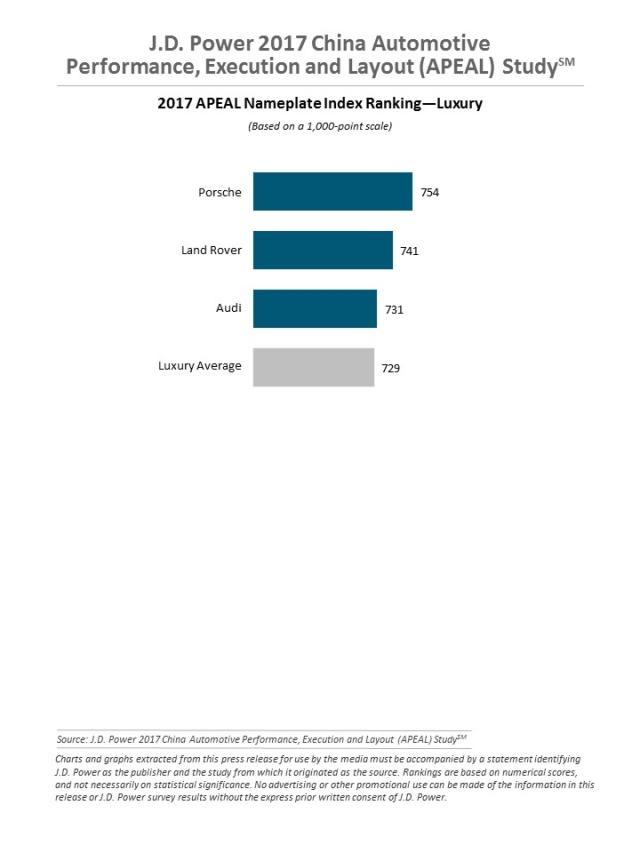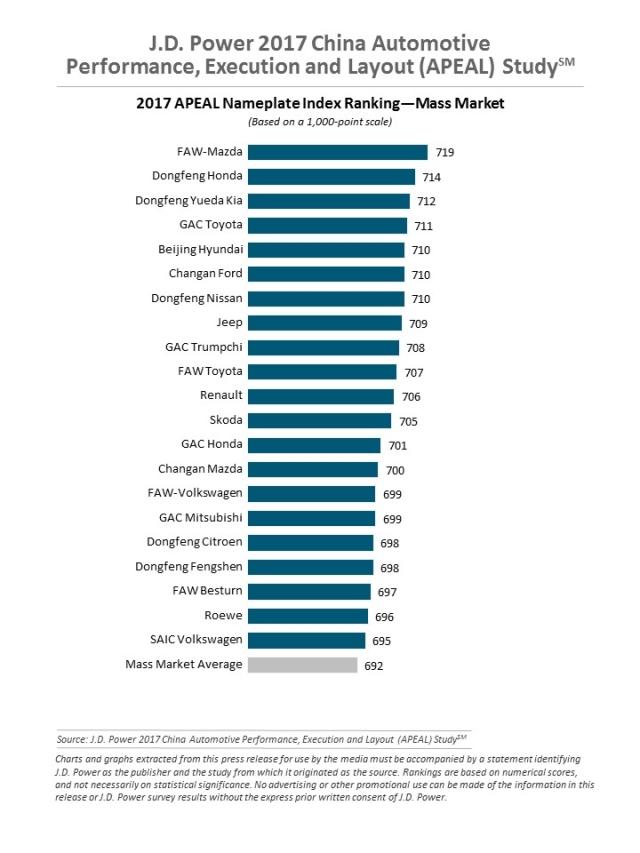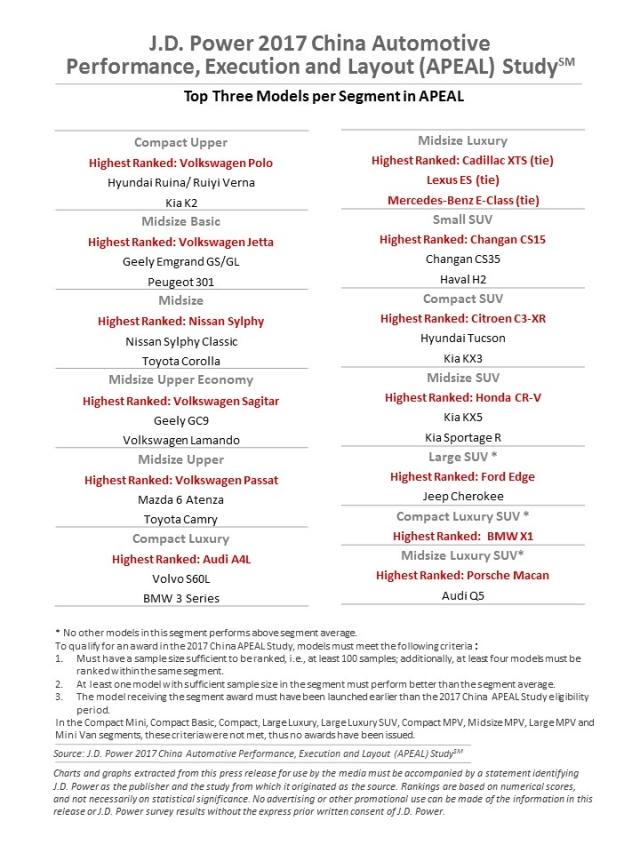Despite Booming Sales, SUVs Are Losing Appeal in China, J.D. Power Finds
Porsche and FAW-Mazda Rank Highest in Their Respective Segments;SAIC Volkswagen and FAW-Volkswagen Each Receive Two Model-Level Awards
SHANGHAI: 1 Nov. 2017— Although the market share of SUVs continues to rise in China, their APEAL index is actually going down, and SUVs in China are gradually losing the edge against non-SUVs in soft quality, according to the J.D. Power 2017 China Automotive Performance, Execution and Layout (APEAL) Study,SM released today.
While the growth rate of passenger-vehicle sales in China is slowing down, the SUV boom continues. Its market share is expected to soar up to 43% by the end of this year, compared with 16% in 2011. [1] However, SUVs are becoming less appealing to consumers in China, compared with non-SUVs. In 2011, the APEAL index score for SUVs was 38 points higher (on a 1,000-point scale) than for non-SUVs, compared with only 1 point higher in 2017.
The study also finds that the small SUV segment performs lowest among the seven SUV segments across all 10 measurement categories of the study. Its only improvement was in fuel economy, up 9 points from last year.
“In a market flooded with numerous SUVs, manufacturers have not come up with enough differentiated products,” said Dr. Mei Songlin, Vice President and Managing Director at J.D. Power China. “Despite their affection for SUVs, consumers in China expect more and better experiences from the new vehicles they buy, especially regarding new technologies and intelligent functions. Our 2017 APEAL Study indicates that automakers in China need to increasingly compete with differentiated products to sustain growth and success in the SUV market.”
Following are additional findings of the study:
- APEAL index is affecting consumers’ purchase decision: Among the top five purchase reasons cited by consumers in 2017, three are APEAL-related ones: vehicle performance; vehicle safety; and desired vehicle body type, attractive design and styling. In 2009, there was only one APPEAL-related: desired vehicle body type.
- Korean brands experience a decline: AlthoughKorean auto brands (711) outscore others in the 2017 study, they experience a decline this year. Korean brands are followed by European (709); Japanese (708); U.S. (698); and Chinese (676) brands. The APEAL index score for Korean brands has declined by 49 points year over year.
- Gap between Chinese domestic and international brands is narrowing: This year, the gap between the two segments (26 points) continues to narrow for the ninth consecutive year, with Chinese brands at 676 and international brands at 702.
- Satisfaction lower among consumers born after 1990: The satisfaction score among younger consumers born after 1990 (680) is conspicuously lower than those born in the 1970s (715), which indicates that a younger generation of Chinese new-vehicle buyers have higher expectations and are harder to satisfy.
Study Rankings
Porsche ranks highest in APEAL among luxury brands, with a score of 754. Land Rover (741) ranks second and Audi (731) ranks third.
FAW- Mazda ranks highest among mass market brands, with a score of 719, followed by Dongfeng Honda (714) and Dongfeng Yueda Kia (712).
SAIC Volkswagen (Volkswagen Polo and Volkswagen Passat) and FAW-Volkswagen (Volkswagen Jetta and Volkswagen Sagitar) have two models that receive model-level awards.
Other models that rank highest in their respective segments are the Nissan Sylphy; Audi A4L; Cadillac XTS; Lexus ES; Mercedes-Benz E-Class; Changan CS15; Citroen C3-XR; Honda CR-V; Ford Edge; BMW X1 and Porsche Macan.
The 2017 China Automotive Performance, Execution and Layout (APEAL) Study measures owners’ emotional attachment and level of excitement across 77 attributes in 10 vehicle performance categories: vehicle exterior; vehicle interior; storage and space; audio/ entertainment/ navigation; seats; HVAC; driving dynamics; engine/ transmission; visibility and driving safety; and fuel economy. These attributes are combined into an overall APEAL index score that is measured on a 1,000-point scale.
The study, now in its 15th year, is based on evaluations from 23,933 owners of new vehicles purchased between September 2016 and May 2017. The study analyzes models in 22 vehicle segments and includes 251 different passenger-vehicle models from 68 different brands. The field work was conducted from March through July 2017 in 67 major cities across China.
J.D. Power is a global leader in consumer insights, advisory services and data and analytics. Those capabilities enable J.D. Power to help its clients drive customer satisfaction, growth and profitability. Established in 1968, J.D. Power is headquartered in Costa Mesa, California, and has offices in Shanghai, Beijing, Tokyo, Singapore, Malaysia and Bangkok serving the Asia Pacific region. J.D. Power is a portfolio company of XIO Group, a global alternative investments firm headquartered in London, and is led by its four founders: Athene Li, Joseph Pacini, Murphy Qiao and Carsten Geyer. For more information, please visit china.jdpower.com or stay connected with us on J.D. Power WeChat and Weibo.
Media Relations Contacts
Shana Zhuang; J.D. Power; China; +86 21 2208 0831; shana.zhuang@jdpa.com
Geno Effler; J.D. Power; Costa Mesa, California, USA; 001-714-621-6224; media.relations@jdpa.com
About J.D. Power and Advertising/ Promotional Rules www.jdpower.com/about-us/press-release-info
# # #
[1]Source: LMC Automotive LLC; 2017 data is forecasting data.


